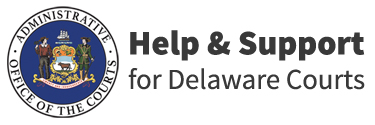Bail & Bail Bonds
What is bail?
Bail is the amount of money a defendant must post to be released from custody until their trial is heard. The purpose of bail is to ensure the defendant's appearance at all court trials and hearings. Once the defendant's trial has concluded, the bail is returned to the individual who posted it. If the defendant fails to appear, he/she risks having the bail forfeited.
The judicial officer will weigh many factors when deciding the amount of bail. Some of these factors include the risk of flight by the defendant, the type of alleged crime, how long the defendant has lived in Delaware, the safety of the community and the defendant's criminal history (if any). Bail may be imposed with certain conditions such as, a no contact order with the alleged victim in the case.
A bail bond is a written guarantee that a defendant will attend all further Court proceedings.
Types of Bail
- Own Recognizance Bail
The judicial officer may release a defendant on his/her own recognizance, also known as "OR" bail. The defendant is not required to pay any money, but must sign a bond guaranteeing their appearance for future court appearances. - Unsecured Bail or Signature
If a judicial officer imposes an unsecured bond, the defendant must sign a bond guaranteeing his/her appearance for future court appearances. If the defendant does not appear, the Court will require the defendant to pay a designated amount of money. - Secured Bail
The defendant must pay the Court a designated amount of money or post security in the amount of the bail in order to be released. This security can be in the form of cash or property and may be posted by the defendant or by someone on his/her behalf, e.g., a relative or a bail bondsman. - Cash Only
The defendant, or someone on his/her behalf, must pay the Court a designated amount of money in order to be released. The defendant and the co-signer, if any, must sign the bond that guarantees the defendant's appearance at future court appearances.


